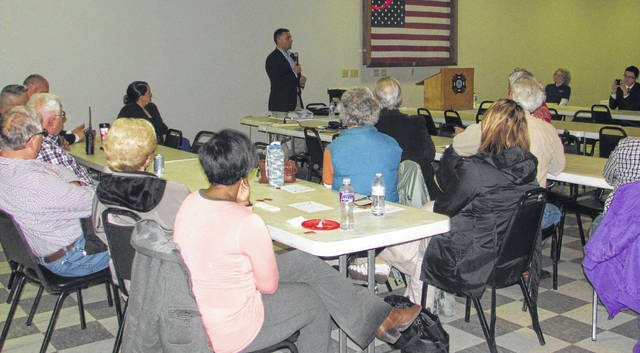
SIDNEY — It’s an issue hard to believe is going on within our local communities, but is the fastest growing and second largest criminal industry in the world today and may be happening right here: human trafficking. This was the topic presented by the Shelby County Liberty Group during the public forum held at the VFW Hall on Monday evening.
Raven Loaiza and Rep. Nino Vitale, R-Urbana, 85th District, presented information to nearly 75 people about how to recognize victims and respond. Loaiza is the regional rape crisis coordinator/bilingual sexual assault and human trafficking survivor advocate with the Rape Crisis and Anti-Human Trafficking Division of Crime Victim Services. Vitale represents Champaign, Logan and Shelby counties and is a sponsor of “The Ohio Human Trafficking and Child Pornography Protection Act.” He has been in private business for 24 years and he and his wife of 18 years are the parents of five boys. They are also Ohio foster parents. Vitale is a pro-life leader who believes in constitutional principles and is a promoter of strong families.
Loaiza said human trafficking is $150 billion a year criminal industry world wide. And although it is difficult to know exact numbers, it is estimated that there are over 20.9 million men and women victims globally. This number includes 5.5 million children. Approximately 55 percent of victims are women and girls.
Loaiza said human trafficking is the buying and selling of another human being in exchange for a good or service; it is modern day slavery. The federal legal definition is the act of recruiting, harboring, transporting, obtaining, and exploiting a victim is conducted through the means of force, fraud or coercion for sexual exploitation or labor exploitation. She said it must have a triangular effect to be considered human trafficking, meaning it must include a third person facilitating the act through force, fraud or coercion. (For those under the age of 18, the federal definition of human trafficking does not to include the means of force, fraud or coercion.)
Labor trafficking victims work in private home, sweat shops, agricultural positions, mining, nail salons, the hospitality industry or as child soldiers. Sex trafficking work in prostitution, pornography, strip clubs, live sex shows, massage parlors, as mail order brides and child brides.
Loaiza said in some cases people are used for labor trafficking in private homes (or other labor positions) for up to 18 hours a day and often can only obtain basic personal needs, like deodorant, after performing sex acts.
She said victims are often hard to help because they are shamed into silence and through isolation. She also said, similar to domestic violence and child abuse victims, they often find it difficult to break away from their abusers because of trauma bonding and because it is familiar or all they know as normal. She said runaway children are at the greatest risk of encountering traffickers, usually within three days of leaving their home.
Red flags to be aware of are, seeing someone with large amounts of cash, noticing if a person doesn’t know what city he/she is in, if a person cannot give their address or is not in control of their identification documents, people rotating in and out of hotels, or young females calling a man dad that seems inappropriate. Sporting events are often places victims are found. Loaiza said Super Bowl Sunday is the largest trafficking day of the year.
Vitale spoke about the new human trafficking/child pornography bill he is sponsoring and hopes to introduce to Congress soon. He referred to it as a short bill that aims to keep pornography from reaching children or those not intending to view it. He said the bill would mandate Internet service providers (ISP) to turn on filters to block pornography. The filters can be turned off by contacting your ISP, proving you are 18-years-old and be charged a $20 fee, which would go toward the human trafficking fund.
He said Ohio is the fourth largest out of 50 in call volume to the National Human Trafficking Resource Center. He said in Ohio in 2010, there was over 1000 confirmed cases of minors.
He also said there is no way for the viewer to know if all of the people participating in pornography scene were willing participants or were forced illegally. He said the addictive aspect of pornography is apparent in that two-thirds of human resources professionals find pornography on computers at work.
Vitale said the average age of a first exposure to pornography is 11 years of age. He said 90 percent of 8- to 16-year olds have viewed porn online when doing homework. Loaiza and Vitale both stressed that parents need to be aware of the apps on their children’s phones and of their activity online.
“You can’t go see a rated “R” movie, but our kids and grandkids are walking around with these smartphones, and these 4- 5- 6-inch screens and can see all sorts of things. And you ask parents, do you know what’s being texted back and forth? Do you have a filter on the phone, on your home — the internet?…,” Vitale said.
Loaiza said the way to help victims is to know the red flags, help raise awareness, get involved with fundraisers or coalitions, and report suspicious activity. For emergency situations, call 9-1-1, and be specific, or call the local number at 877-867-7273 to report information. Also, you may call the National Human Trafficking Resource Center’s toll free number at 888-3737-88.


